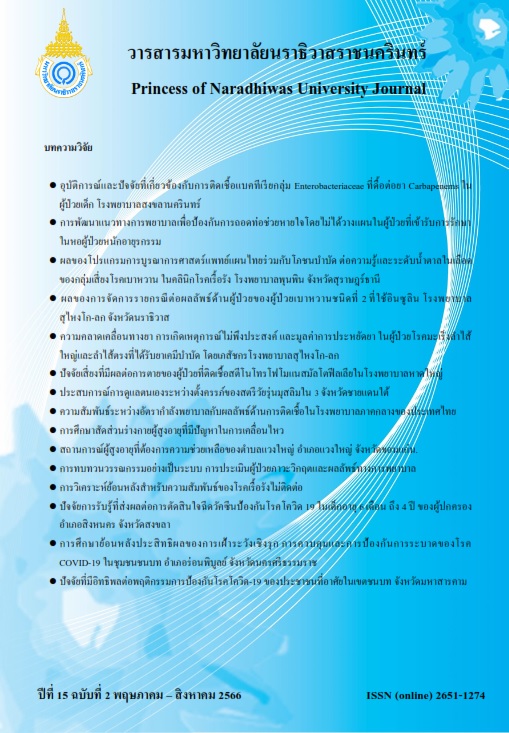The Effect of Case Management on Outcomes Among Insulin Dependent Type 2 Diabetes Patients in Sungaikolok Hospital, Narathiwat Province
Keywords:
Case management, Type 2 Insulin-Dependent Diabetes, InsulinAbstract
The quasi-experimental research aimed to examine the effect of case management on patient outcomes in patients with type 2 diabetes using insulin Samples were 60 patients with type 2 diabetes using insulin; 30 patients in an experimental group and 30 patients in a control group. An experiment group received a series of activities for 12-week. A series of activities included knowledge training, self-care training, health assessment, problem analysis, planning with professional team, counseling, home visitation and follow-up, called a case management process based on a 6-step process. The research instruments consisted of a diabetes knowledge questionnaire, a self-care competency questionnaire, and a blood glucose log form. The instruments were verified by 3 experts and received reliability 0.96. Data were analyzed using frequency, percentage, mean, standard deviation, Wilcoxon Match-paired Sign Rank and Mann-Whitney U test.
The results revealed that after the case management, patients with type 2 diabetes who used insulin in the experimental group had higher scores on diabetes mellitus knowledge than before receiving the case management, and the experiment group had sugar blood level better than before the experiment and better than the control group with a statistical significance at .05.
The results showed that case management had a positive effect on patient outcomes. Increasing knowledge about diabetes affects the ability to take proper care of yourself leading to good disease control. Nurses can use it as a guideline for caring for people with diabetes and other chronic diseases.
References
American Diabetes Association. (2020). Standards of medical care in diabetes. Clin Diabetes, 38 (1), 10–38.
Aiamsaart, N., Thaweeses, P., & Chumchai, P. (2020). The effect of case management to overall abilities among schizophrenia patients with the risk for violence. Journal of Somdet Chaopraya Institute of Psychiatry, 14(1), 10-22.
Bureau of Non-Communicable Diseases Department of Disease Control. (2020). Non- communicable disease information. Division of Non-communicable Diseases, Department of Disease Control. Retrieved December 20, 2021 from http://www.thaincd.com/2016/media-detail.php.
Chaiyarit, A. (2020). Program on Levels of Fasting Plasma Glucose among Type 2 Diabetes Mellitus Patients. Journal of The Royal Thai Army Nurses, 21(2), 213-221.
Chaimai, A., & Fukfon, K. (2018). Nursing Case Management for People with Type 2 Pre-diabetes Mellitus in Community. Nursing Public Health and Education Journal, 19(2), 17-28.
Hong, J., Ronghao, C., Wang, & Yong, H. (2019). Effect of simulation education and case management on glycemic control in type 2 diabetes. Diabetes / Metabolism Research and Reviews, 39(3), 1-7.
Jittsue, A., Sangjam, P., Treesak, C., & Hanlerdrit, T. (2016). Assessment of Knowledge and Practice of Patients Before and After Counseling in the Use of the Reusable Insulin Pen at Vachiraphuket Hospital. Songklanagarind Medical Journal, 34(1), 27-37.
Kristen, H. (2022). How to Become a Nurse Case Manager. Retrieved September 10, 2022 from https://nursejouranal.org/careers/nurse-case-management/how-to-become/.
Liyun, C., Caixue, L., Chenyun, X., & Jun, Z. (2020). Research Progress of Case Management and Evaluation of Quality of Life in Patients with Diabetes by Out-Patient. Nurses. Journal of Diabetes Mellitus, 10, 245-254.
International Diabetes Federation. (2021). IDF diabetes atlas. Retrieved December 10, 2022 from https://www.diabetesatlas.org.
Ministry of Public Health. (2020). Hdc serviceplan [Internet]. Retrieved December 15, 2020 from https: // hdcservice.moph.go.th/hdc/main/index_pk.php.
Nutesh, A. (2012). Effect of case management program on self-care capabilites of hospitalized type-2 diabetic patients. Master of Nursing Science. Faculty of Nursing Prince of Songkla University Songkla. (in Thai).
Pitak, P., Neelapaijit, N., Fuangchan, A., & Dhippayom T. (2023). An assessment of adherence for insulin uses in patients with diabetes. Thai Bull Pharm Sci, 18(2), 1-20.
Powell, S.K., & Tahan, H.A. (2010). Case management: A practical guide for education and practice. 3nd edition. Philadelphia: F.A Davis company.
Sarah, A. (2019). Case management: An overview for nurses. Retrieved September 10, 2021 from https://journals.lww.com/nursing/Fulltext/2019/09000/Case_management__An_overview_for_nurses.11.aspx
Tsai, C.Y., Lü, Y.C., Wang, L.T., Hsu T.L., & sung, J.L. (2018). Substantial effects of empowerment case management on physical health of type 2 diabetic patients. Journal of Clinical Nursing, 27(7-8), 1632-1640.
Tzipi, G., & Joseph, A. (2023). Diabetes Control in the Community, Under the Management of a Diabetes-Clinic Nurse Specialist, and the Effect of a Parallel Diabetologist Advice. Nurses. Journal of Primary Care and Community Health, 14, 1-6.
World Health Organization. (2022). Global status report on no communicable diseases. Retrieved September 10, 2022 from https://www.who.int/news-room/fact-sheets/detail/ diabetes.
Additional Files
Published
How to Cite
Issue
Section
License
Copyright (c) 2023 Princess of Naradhiwas University Journal

This work is licensed under a Creative Commons Attribution-NonCommercial-NoDerivatives 4.0 International License.




